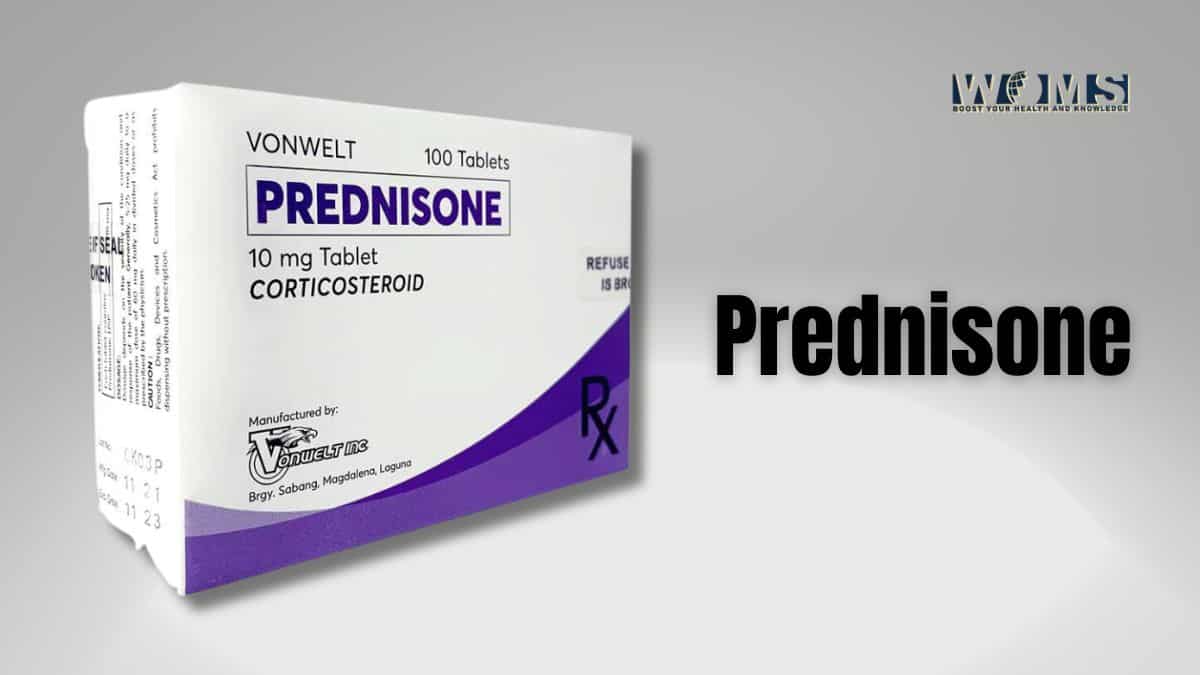Prednisone: Uses, Side Effects, Important Warnings and Interactions

Prednisone is a synthetic medication that is commonly used to treat a variety of inflammatory conditions. It belongs to a class of drugs called glucocorticoids, which mimic the effects of cortisol, a hormone naturally produced by the adrenal glands. It is useful for treating conditions such as asthma, rheumatoid arthritis, lupus, allergies, and certain skin conditions. It works by reducing inflammation and suppressing the immune system’s response.
Prednisone is available in various forms, including tablets, oral solutions, and injections. The dosage of treatment and duration depends on the specific condition being treated and the individual patient. It’s important to follow the prescribed dosage and take prednisone as directed by a doctor, as long-term or high-dose use can have side effects.
What is prednisone used for?
Prednisone is prescribed for various reasons depending on the medical condition being treated. Here are some common reasons for prednisone may be prescribed:
Inflammatory conditions: It is frequently prescribed to reduce inflammation in conditions such as rheumatoid arthritis, osteoarthritis, bursitis, tendinitis, and other types of joint or musculoskeletal inflammation.
Allergic reactions: It can help alleviate symptoms of severe allergic reactions, including allergic rhinitis (hay fever), allergic dermatitis, and allergic asthma.
Asthma and respiratory conditions: It may be prescribed during acute episodes of asthma to reduce airway inflammation and improve breathing.
Autoimmune diseases: It is used in the management of various autoimmune diseases, including systemic lupus erythematosus (SLE), multiple sclerosis, and vasculitis. It helps suppress the immune system and reduce inflammation associated with these conditions.
Skin conditions: It can be prescribed for severe or chronic skin conditions such as psoriasis, eczema, dermatitis, or allergic skin reactions.
Organ transplant: After an organ transplant, it is often part of the immunosuppressive regimen to prevent organ rejection by suppressing the immune system.
Inflammatory bowel disease (IBD): It may be prescribed during flare-ups of ulcerative colitis or Crohn’s disease, helping to reduce inflammation in the digestive tract.
How to use oral prednisone?
When using prednisone oral tablets, it’s crucial to follow the instructions provided by your doctor. Here are some general guidelines for using this drug:
Dosage: Take the medication exactly as prescribed by your doctor. The dosage will depend on your specific condition, its severity, and other factors. Prednisone tablets come in different strengths, so be sure to take the prescribed strength.
Timing: It is usually taken once daily in the morning with food or a meal. Taking it with food can help reduce the likelihood of stomach upset.
Swallowing: Swallow the tablet whole with water. Do not crush, break, or chew it unless your doctor specifically instructs you to do so.
Duration: Follow the prescribed duration of treatment. It is often prescribed for a specific period, and it’s generally not recommended to stop taking it abruptly or without medical guidance.
Compliance: Take the medicine regularly and at the same time each day. If you miss a dose, take it as soon as you remember. If it’s close to the next dose, skip the missed dose and continue with your regular schedule. Do not double the dose to make up for a missed one.
Tapering: Depending on the duration of treatment, your doctor may gradually decrease the dosage (taper) before stopping it completely. This helps prevent potential withdrawal symptoms and allows your body to adjust.
Follow-up: Attend follow-up appointments with your doctor to monitor your progress, assess the effectiveness of the medication, and manage any potential side effects.
What are prednisone’s side effects?
Prednisone can cause a range of side effects, and the likelihood and severity of these side effects can vary depending on the dose, duration of treatment, and individual factors.
Here are some common side effects:
- Increased appetite and weight gain.
- Fluid retention and leading to swelling in the hands and feet.
- Mood swings, irritability, and changes in behavior.
- Difficulty sleeping (insomnia).
- High blood pressure.
- Elevated blood sugar levels (especially in individuals with diabetes).
- Weakening of the bones (osteoporosis) with long-term use.
- Increased susceptibility to infections.
- Suppression of the immune system.
- Stomach irritation, leading to ulcers or gastrointestinal bleeding.
- Skin issues, such as acne or thinning of the skin.
- Cataracts or glaucoma with long-term use.
- Menstrual irregularities in women.
- Delayed wound healing.
Not everyone experiences all of these side effects, and some individuals may have no side effects or only mild ones. Additionally, many of these side effects are more likely to occur with long-term use or high doses of prednisone.
Important warnings
Prednisone is a potent medication that comes with several important warnings. It’s essential to be aware of these warnings and follow your doctor’s guidance closely while taking this medication.
Some important warnings include:
Immunosuppression: It suppresses the immune system, making you more susceptible to infections. Avoid contact with people who have contagious illnesses such as chickenpox or measles, and promptly report any signs of infection to your doctor while taking it.
Adrenal insufficiency: Long-term or high-dose use of this drug can suppress the body’s natural production of cortisol, leading to adrenal insufficiency. When stopping it after prolonged use, it’s essential to gradually taper the dosage under medical supervision to allow the adrenal glands to resume normal cortisol production.
Glucose regulation: It can elevate blood sugar levels, especially in individuals with diabetes. Regular monitoring of blood glucose is essential if you have diabetes or if you develop increased thirst or frequent urination while taking prednisone.
Osteoporosis: Long-term use of this drug can lead to a loss of bone density and increase the risk of osteoporosis. Your doctor may recommend calcium and vitamin D supplements, along with weight-bearing exercises, to help protect your bones.
Psychiatric effects: It can cause mood changes, irritability, anxiety, and in some cases, more severe psychiatric effects. If you experience significant mood changes or behavioral issues, consult your doctor promptly
Eye problems: Prolonged use of this drug may increase the risk of cataracts and glaucoma. Regular eye check-ups are recommended while taking this medication.
Stomach issues: It can irritate the stomach lining, potentially leading to stomach ulcers or gastrointestinal bleeding, especially when taken with NSAIDs. This drug-taking with food can help reduce the risk of stomach upset.
Growth effects in children: Long-term use of prednisone in children can affect growth and development. Regular monitoring of growth is essential when using prednisone in pediatric patients.
Allergic reactions: Some individuals may be allergic to prednisone or the components of the medication. Look for immediate medical attention if you experience signs of an allergic reaction, such as difficulty breathing, hives, or swelling of the face, lips, tongue, or throat.
Interaction with other medications
Prednisone can potentially interact with other medications, which is why it’s important to inform your doctor about all the medications you are taking, including prescription medications, over-the-counter drugs, supplements, and herbal products. Drug interactions can affect the effectiveness of prednisone or increase the risk of side effects.
Here are some examples of medications that may interact with this drug:
Nonsteroidal anti-inflammatory drugs (NSAIDs): NSAIDs like ibuprofen or aspirin may increase the risk of stomach ulcers or gastrointestinal bleeding when taken concurrently with prednisone.
Anticoagulants: It can interact with anticoagulant medications like warfarin, increasing the risk of bleeding. Close monitoring of clotting factors is necessary in such cases.
Diuretics: Some diuretics, particularly loop diuretics like furosemide, can lower potassium levels in the blood. When taken with this drug, the risk of low potassium (hypokalemia) may increase.
Antifungal medications: Certain antifungal medications, such as ketoconazole and itraconazole, can inhibit the metabolism of prednisone, leading to increased levels of prednisone in the body and a higher risk of side effects.
Anticonvulsants: Some anticonvulsant medications, such as phenytoin and phenobarbital, may increase the metabolism of prednisone, potentially reducing its effectiveness.
Certain antibiotics: Rifampin, a commonly used antibiotic, can enhance the breakdown of prednisone in the body, reducing its effectiveness.
Vaccines and immunizations: Prednisone can weaken the immune system’s response to vaccines, so it’s important to consult with your doctor before receiving any live vaccines or immunizations.
Certain HIV medications: Protease inhibitors used to treat HIV can interfere with the metabolism of prednisone, potentially leading to increased prednisone levels.
Medications affecting the liver enzymes: Drugs that inhibit or induce specific liver enzymes may alter the metabolism of prednisone and affect its efficacy.
These are just a few examples, and there may be other medications that can interact with prednisone.
Warnings for people with certain health conditions
Prednisone may not be suitable for individuals with certain health conditions or may require special precautions. It’s important to inform your healthcare professional about your complete medical history before starting it.
Here are some health conditions that may warrant caution or close monitoring while using prednisone:
Infections: Prednisone can suppress the immune system, making you more susceptible to infections. If you have a current or recent infection, your doctor may need to adjust the dose or delay the use of prednisone until the infection has resolved.
Diabetes: It can increase blood sugar levels, so individuals with diabetes may require adjustments in their diabetes medication or insulin doses while taking prednisone.
Hypertension (high blood pressure): It can cause fluid retention and raise blood pressure. If you have hypertension, your doctor may closely monitor your blood pressure and adjust your treatment plan if needed.
Osteoporosis: It can contribute to bone loss, so individuals with osteoporosis or a history of fractures may require additional measures to protect their bones.
Peptic ulcers or gastrointestinal issues: It can irritate the stomach lining and worsen existing ulcers or gastrointestinal problems. Special precautions may be necessary if you have a history of these conditions.
Glaucoma or cataracts: Long-term use of prednisone can increase the risk of developing glaucoma or cataracts. Individuals with existing eye conditions may need close monitoring while using this medication.
Liver or kidney disease: It is metabolized in the liver and excreted by the kidneys. Individuals with impaired liver or kidney function may require adjusted dosages of this drug.
Heart conditions: It can cause fluid retention and electrolyte imbalances, which may be a concern for individuals with certain heart conditions.
Mental health issues: Individuals with a history of depression, anxiety, or other psychiatric disorders may experience worsened symptoms while on this drug.
Pregnancy or breastfeeding: It may have risks for pregnant or breastfeeding individuals and should only be used if the potential benefits outweigh the potential risks. It’s essential to discuss this with your doctor if you are pregnant or breastfeeding.
Conclusion
prednisone is a potent corticosteroid medication used to treat a wide range of medical conditions, primarily those involving inflammation and immune system dysregulation. It is commonly prescribed for conditions such as allergies, asthma, rheumatic disorders, skin diseases, and certain endocrine disorders. Prednisone works by suppressing the immune response and reducing inflammation, providing relief from symptoms in many cases.
However, prednisone also comes with potential side effects, especially with long-term use or high dosages. Common side effects include weight gain, mood changes, increased blood sugar levels, and bone density loss. Therefore, it is typically used for short periods and at the lowest effective dose to minimize side effects.
FAQs
How does prednisone work?
It works by suppressing the immune system and reducing inflammation in the body. It acts as an anti-inflammatory and immunosuppressive agent, which helps to alleviate symptoms associated with various conditions.
What are the common side effects of prednisone?
Common side effects include increased appetite and weight gain, mood swings, difficulty sleeping, elevated blood sugar levels, and weakening of the bones (osteoporosis). Other side effects may include fluid retention, high blood pressure, and increased susceptibility to infections.
Can prednisone be used long-term?
It is generally intended for short-term use due to the risk of side effects with prolonged use. Long-term or high-dose use may lead to more serious side effects, such as Cushing’s syndrome, adrenal suppression, and increased infection risk.
How is prednisone dosed for different conditions?
The dosage of prednisone varies depending on the medical condition being treated, its severity, and the individual’s response to the medication. Prednisone is often prescribed at higher doses during acute exacerbations, which are then gradually tapered down to a lower maintenance dose.
Is it safe to suddenly stop taking prednisone?
No, it is not safe to abruptly stop taking prednisone, especially after prolonged use. Sudden discontinuation can lead to adrenal insufficiency or withdrawal symptoms, such as fatigue, joint pain, and fever. Prednisone is usually tapered off slowly under medical supervision when stopping treatment.
Can prednisone be used during pregnancy or breastfeeding?
It should be used with caution during pregnancy or while breastfeeding. The potential benefits and risks to both the mother and the baby should be carefully assessed by a doctor before using prednisone in these situations.
Can prednisone be taken with food?
Prednisone can be taken with or without food. However, taking it with food can help reduce stomach irritation and discomfort.
Prednisone is not typically used to treat viral infections. It is an immunosuppressive medication, and its use for viral infections can weaken the immune system, potentially worsening the infection. Prednisone is more commonly used for conditions involving inflammation or immune system dysregulation.




